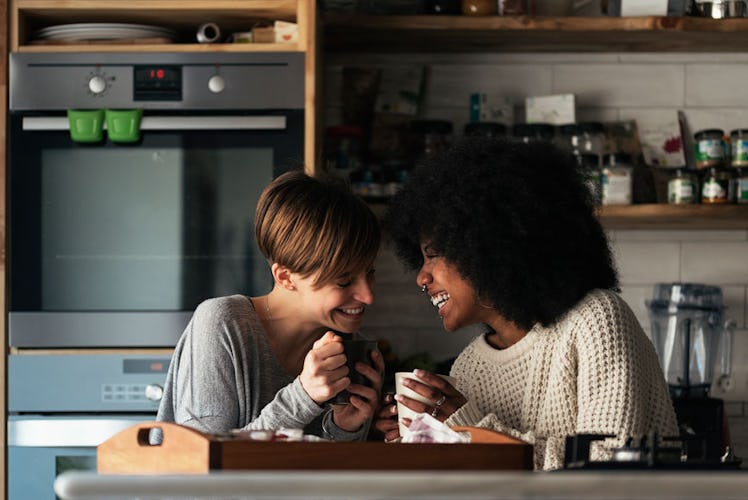
A Therapist Reveals How To Have That First Deep Conversation With A New Friend
Friendships are one of (if not the single) greatest parts of being a human. Finding people you connect to, trust, and enjoy spending time with is what makes it possible to get through this wild ride we call life. But when you first start getting comfortable with someone, it can be hard to know how to have a deep conversation with your friend, particularly if you guys haven't reached that whole "tell each other everything" stage just yet.
It's one of the best feelings in the world to be able to open up to someone about your deepest thoughts and feelings, and to know they're comfortable doing the same with you. But how do you break that "acquaintance" barrier, so to speak, and begin broaching those topics for the very first time? And, perhaps more importantly, how do you do that without, you know, completely scaring your friend off and ruining the friendship before it even has a chance to really begin?
According to counselor and relationship expert David Bennett, the biggest thing to keep in mind here is each person's boundaries in the friendship. Moreover, he says, it's important to commit to developing the relationship slowly over time. "One problem of going 'too deep, too soon' is that it can get awkward and intrusive if your new friend isn’t ready," Bennett tells Elite Daily. "Also, when you start to get into deeper conversation, you’re risking saying things that could hypothetically strain (or even end) the friendship."
Bennett also points out that this is especially true today, when many people feel extremely divided by political and personal views. But rest assured, it's not that daunting in practice to move a budding friendship to that deeper level. Here are a few ways to start having those meaningful, life-changing conversations with a friend.
You Have To Get Cool With Being Vulnerable
Being vulnerable is hard, and telling your truth can be scary. But it's where the magic happens with real connection.
"You’ll have to be vulnerable, at least to a degree," says Bennett. "If you want the friendship to deepen, you’ll have to put your personal feelings and viewpoints out there, and be ready to accept the consequences."
But oftentimes when you share something, it gives your friends room to open up, too. Perhaps start small, by sharing a personal memory, or a rather challenging breakup story, Bennett recommends.
Let Your Friend Be Vulnerable, Too
What's just as important (if not more-so) than sharing, is being the kind of person your friend feels like they can trust with their stories and feelings. "Most people are afraid to go deeper with others because they are worried about judgment or negative reactions," Bennett tells Elite Daily. "If you start talking about deeper things, be open to your friend’s deeper feelings and ideas. Refrain from judging or doing all the talking."
Your friend has to feel just as comfortable as you do with these deeper conversations, the counselor explains.
Take Things Nice And Slow
Everyone overshares sometimes — it happens. But, according to Bennett, it's best to be mindful of how whatever it is you're sharing might make the other person feel, and to try to carefully gauge their comfort level as you shift into those deeper or more intimate topics. For instance, if you find yourself sharing one of your secrets with a friend, get a sense for how they're feeling by paying attention to their facial expressions, and what they say (or don't say) in response.
"Nobody likes to be getting along with someone as a new friend and have a bunch of deep feelings or views dumped on them out of the blue," says Bennett. Instead, he suggests, try to gradually share more of your true self, and be sure to open yourself up to their sharing, too. Research shows that true friendships take a lot of time to develop, especially deeper ones.
Focus On The Positives
According to Bennett, one problem with having these deep conversations is that they can bring up points of disagreement between you and your friend. Once you learn there are things about your friend you didn't initially know, like maybe their feelings about politics or other controversial issues, some of what you find out may not totally jive with who you are and what you believe.
"A true friend focuses on commonalities and tries to learn from their friend’s differences," Bennett points out. In other words, just because you and your friend disagree about something outside your friendship, that doesn't mean the relationship is totally doomed, or that you no longer have anything in common. As Bennett suggests, do your best to learn from one another, instead of passing judgment or allowing it to ruin your connection.
If Things Get Weird, Stay Calm
If you and your friend do wind up disagreeing with one another on a deeper topic, or even if there are some uncomfortable moments that come up as you begin to share, Bennett says it's not the end of the world, or the friendship. "If a difference arises, remember the reasons why you like the person," he tells Elite Daily. "Remember where they are coming from, and hopefully your friend takes this same charitable view."
Most friendships have awkward moments, and in my experience, actually, only the best ones have those moments from time to time. You just have to be able to laugh about it, learn from it, and move on.